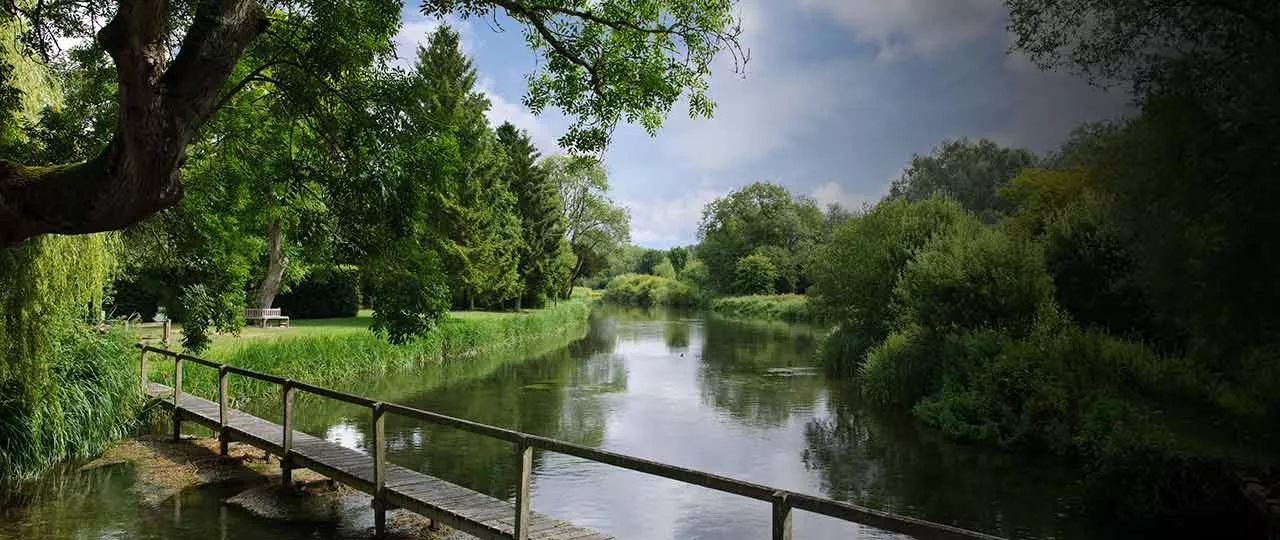
Hampshire and Wiltshire’s prime fishing spots are renowned among fly fishers across the country - Rhodri Thomas, from Strutt & Parker’s Salisbury Office, guides us through them.
There are few better places to fish for trout than the crystal clear chalk streams of Wiltshire and Hampshire – the Crown Jewels of the dry fly fishing world.
These counties – with their ample fly life and rivers full of trout, salmon and grayling – are favoured by fishermen from all over the world but are so easily accessible for anglers from London and across the south and south east who can drive down at evenings and weekends to take advantage of this unique chalk stream fishing.
Hampshire
There are many trout streams, but two main fishing rivers in Hampshire – the Test and the Itchen.
The Test is a river with huge variety. It’s arguably the most famous chalk stream in the UK, stretching for nearly 40 miles and, at in the stunning upper reaches from its source near Ashe and through the villages of Longparish, Middleton and Chilbolton, it presents what many view as classic chalk stream fishing.
Through the middle reaches of the river; Leckford, Houghton, Mottifont and Kimbridge and of course, the rendezvous for every Test fisherman the town of Stockbridge it begins to form into a number of bystreams as well as the main river channel and at the lower reaches near Romsey it becomes a much wider river – between Romsey and Ashe there is some fantastic fly fishing to be had.
The Itchen – a neighbour of the Test and less than half the length – is seen by many as the puritan’s Hampshire chalk stream. It’s just a bit more natural. It’s smaller but among the upstream dry-fly fishermen it remains so much more - a traditional brown trout habitat river than its famous neighbour.
From Alresford to Winchester it flows West where it cuts through the grounds of Winchester College. The college owns the rights to fish here, so is a bit of favourite among parents of the students. In the city, it turns south running for nearly 14 miles to Southampton, where you’ll find salmon at the Woodmill pools.
Wiltshire
Salisbury has a number of the main chalk streams in the county right on its doorstep. The key ones are the Wylye, Nadder and Avon – also sometimes referred to as the Hampshire Avon.
These tend to be a bit smaller than their Hampshire counterparts, but they are the flagship chalk streams of the region and most regular fishermen will have heard of them – if not cast a line from their banks.
The season opens on these rivers in mid-April and the mayfly start hatching towards the end of May, sticking around until the end of July.
Most of the beats here are predominately syndicated or in private ownership, meaning there’s not a huge number of spots where you can ‘turn up’ and fish.
Most commonly you’d need to become a member of one of the clubs or syndicates that fish these waters - such as the Salisbury and District Angling Club. There is a waiting list but it’s still the easiest way to secure fishing. There are local rates for joining and what is referred to as the ‘London membership’, which is an alternative rate for those outside the SP postcode.
For those living outside a 14-mile radius from the centre of Salisbury, the waiting list is around 3 to 4 years long. Those within the SP postcode need only wait a year – but this all depends on membership turnover.
The Piscatorial Society also retains fishing rights through Wiltshire and Hampshire which is reputed to be one of the oldest angling societies in England and still favours a naturalist approach with its key objectives being for wild or naturalised fly fishing and to preserve the chalk stream environment.
There are of course other societies and syndicates, some of which allow a set amount of guests a day, so check before you join one if you want to do so.
Finding a spot to fish
As these are, I believe, two of the best fishing regions in England, demand for fishing is high, so it can be tough to fish these rivers unless you’re a member of club or society, know one or own a stretch of river.
Most of the local fisheries have a limit on membership numbers and some operate a rotational system, where members are allocated set dates with a certain amount of rods. This means they can do as they please on these days without bumping into any other fishermen on their beat.
Others run a first-come, first-served system where members head to a fishing lodge and pick up the beat ‘key’. This allows them to fish on a certain stretch or beat of the society water.
If you’re an individual who’s not a member of any of the clubs, you can sometimes pick up day tickets through commercial operations; many of which operate through Rods on Rivers.
Your catch will depend on where you’re fishing, when you’re fishing and how you’re fishing. Most experienced fishermen will have the right field craft to know which fly to use. Though there are some stretches of river that run corporate days – an internet search should bring to light a few of these and they will be able to introduce a ghillie who’ll provide advice.
Or, you can sometimes secure a day’s fishing by staying in a property on the river that holds the fishing rights. Some hotels offer such packages.
Want to get serious about your fishing? View out properties for sale in Wiltshire and Hampshire.
